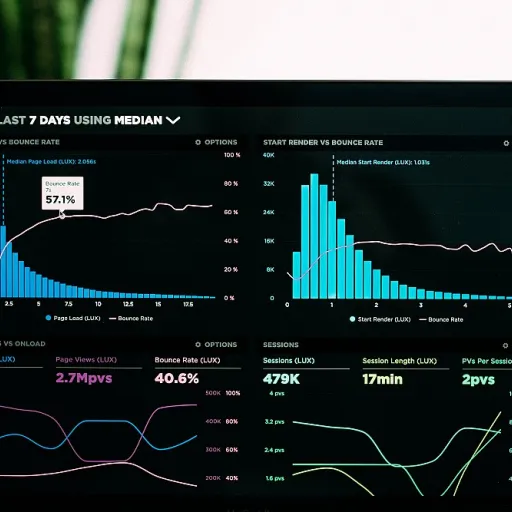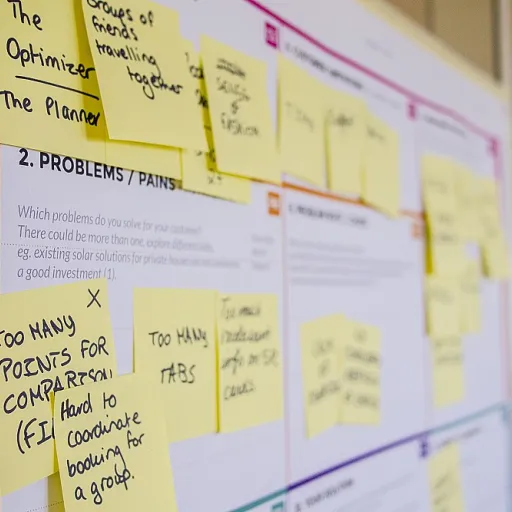
Understanding the basics of a marketing plan for a digital agency
Key Elements of a Digital Agency Marketing Plan
Building an effective marketing plan for a digital agency starts with a clear understanding of the core elements that drive success. A well-structured plan provides a roadmap for reaching your objectives, positioning your agency in the industry, and delivering solutions that resonate with clients. At its heart, the plan should reflect your agency’s unique value, strategic approach, and the needs of your target market.
- Market Analysis: Begin with a thorough analysis of your industry, competitors, and potential clients. This step helps you identify opportunities, threats, and the best positioning for your agency.
- Objectives and Strategy: Define clear, measurable objectives. Your strategy should outline how you will achieve these goals, including advertising channels, content marketing, and email campaigns.
- Client Focus: Understand the needs and pain points of your clients. Tailor your solutions and messaging to provide value and build trust.
- Cost and Resource Planning: Allocate resources efficiently to maximize impact while controlling costs. This includes budgeting for tools, talent, and advertising.
- Performance Measurement: Set up metrics to track progress and adjust your plan as needed. Regular analysis ensures your agency remains agile and effective.
Why a Strategic Approach Matters
Taking a strategic approach to your marketing plan ensures that every action aligns with your agency’s broader goals. This approach not only improves efficiency but also helps you stand out in a crowded market. By focusing on analysis, positioning, and client needs, your agency can provide tailored solutions that drive results.
For agencies looking to stay ahead, integrating artificial intelligence into your strategy can offer a significant advantage. AI-powered tools can enhance your analysis, automate tasks, and uncover new opportunities for growth. To see how AI is transforming digital marketing for agencies, explore this resource on enhancing franchise SEO with artificial intelligence.
The role of artificial intelligence in search engine optimisation
How AI Transforms SEO for Digital Agencies
Artificial intelligence is rapidly changing the landscape of search engine optimisation (SEO), offering digital agencies new ways to enhance their marketing strategy and deliver more effective solutions for clients. By leveraging AI, agencies can automate complex analysis, improve content relevance, and optimise advertising campaigns with greater precision. This shift is not just about technology—it’s about reshaping how agencies approach their objectives and provide value in a competitive industry.
Key Benefits of AI in SEO Strategy
- Data-Driven Analysis: AI tools can process vast amounts of data, allowing agencies to identify trends, understand client positioning, and uncover potential opportunities faster than manual methods.
- Content Optimisation: AI-powered platforms help generate and refine content that aligns with search intent, improving visibility and engagement for agency clients.
- Personalised Advertising: Machine learning algorithms enable more targeted advertising, ensuring that campaigns reach the right audience and support strategic objectives.
- Cost Efficiency: Automation reduces the time and resources needed for repetitive SEO tasks, making the plan more cost-effective and scalable.
AI Applications in Agency Workflows
Integrating AI into your agency’s workflow includes using advanced tools for keyword research, competitor analysis, and performance tracking. These solutions provide actionable insights that inform your marketing plan and help you adapt to industry changes. AI also enhances email marketing by segmenting audiences and personalising messages, increasing the likelihood that clients will engage and share your content.
For a deeper dive into how AI-driven SEO strategies are transforming B2B tech marketing, you can explore this resource on AI-driven SEO for B2B tech marketing.
Aligning AI with Agency Objectives
To make the most of AI in SEO, agencies should align technology adoption with their strategic objectives. This means selecting tools that fit your agency’s positioning and client needs, and continuously measuring their impact. By doing so, you ensure that your marketing plan remains effective, adaptable, and relevant in a rapidly evolving digital environment.
Integrating AI tools into your agency’s marketing plan
Choosing the Right AI Tools for Your Agency
Integrating artificial intelligence into your marketing plan can transform your agency’s approach to search engine optimisation. The first step is to identify which AI solutions align with your strategic objectives and client needs. AI-powered platforms can automate keyword analysis, competitor research, and even content generation, helping your team focus on higher-level strategy and client positioning.
Streamlining SEO Tasks with Automation
AI tools can handle repetitive SEO tasks, such as technical audits, backlink analysis, and on-page optimisation. This automation not only reduces operational costs but also allows your agency to provide more effective solutions to clients. By leveraging AI, your team can quickly adapt to industry changes and deliver data-driven recommendations that improve client outcomes.
- Content optimisation: AI can analyse top-performing content in your industry and suggest improvements for your own pages.
- Keyword research: Automated tools identify high-potential keywords, supporting your agency’s positioning and strategic planning.
- Performance tracking: AI dashboards provide real-time analysis, making it easier to share progress with clients and adjust your plan as needed.
Integrating AI into Your Workflow
To maximise the impact of AI, integrate these tools into your existing marketing and advertising workflows. For example, use AI-driven insights to refine your email campaigns or adjust your content strategy based on predictive analysis. This integration ensures your agency remains competitive and can offer clients innovative, cost-effective solutions.
For agencies aiming to maintain an effective SEO strategy, regular website upkeep is essential. Learn more about the benefits of regular website upkeep packages to support your ongoing optimisation efforts.
Common challenges when using AI for SEO in digital agencies
Key Obstacles When Implementing AI for SEO
Introducing artificial intelligence into your agency’s SEO strategy can be transformative, but it also brings several challenges that need careful analysis. Understanding these obstacles is essential for creating an effective marketing plan that aligns with your objectives and provides value to clients.
Data Quality and Integration Issues
AI-driven SEO solutions rely heavily on high-quality data. Inconsistent or incomplete data can lead to inaccurate analysis, impacting your agency’s ability to deliver strategic recommendations. Integrating AI tools with existing marketing and advertising platforms can also be complex, especially if your systems are not fully compatible or lack standardization.
Cost and Resource Allocation
While AI can optimize processes and reduce manual effort, the initial investment in AI-powered tools and training can be significant. Agencies must balance these costs against potential gains in efficiency and client satisfaction. Allocating resources effectively is crucial to ensure that your plan remains cost-effective and supports your agency’s positioning in the industry.
Skill Gaps and Training Needs
AI technologies evolve rapidly, and staying current requires ongoing training. Your team may need to develop new skills to interpret AI-generated insights and apply them to client campaigns. Without proper training, there’s a risk of misusing tools or miscommunicating results to clients, which can undermine trust and the effectiveness of your strategy.
Transparency and Client Communication
Clients expect clear explanations of how AI influences their SEO performance. However, AI algorithms can sometimes act as a “black box,” making it difficult to provide transparent analysis. Agencies must find ways to communicate AI-driven decisions and results in a way that clients understand, whether through email updates, reports, or strategic meetings.
- Setting realistic objectives: Overpromising on AI capabilities can lead to disappointment. Agencies should set achievable goals and communicate the potential and limitations of AI solutions.
- Maintaining industry compliance: AI tools must be used in accordance with industry standards and privacy regulations to protect client data and maintain credibility.
Continuous Evaluation and Adaptation
The digital marketing landscape is constantly changing. Regularly reviewing your AI tools and their impact on SEO performance is necessary to ensure your agency’s plan remains effective. This includes adapting your strategy based on new industry trends, client feedback, and performance analysis.
Measuring the impact of AI on your agency’s SEO performance
Key Metrics for Evaluating AI-Driven SEO
When your agency integrates artificial intelligence into its SEO strategy, measuring the impact becomes essential. Tracking the right metrics helps you understand if your marketing objectives are being met and if your plan is delivering value to your clients. Here are some effective ways to analyse AI’s contribution to your SEO performance:
- Organic Traffic Growth: Monitor changes in organic search traffic after implementing AI solutions. Compare data before and after AI integration to assess improvements in visibility and reach.
- Keyword Positioning: Use AI-powered tools to track keyword rankings. Evaluate how your strategic positioning evolves over time and identify which keywords are driving the most potential clients to your site.
- Conversion Rates: Analyse how AI-driven content and advertising strategies influence conversion rates. This includes actions like email sign-ups, downloads, or direct client inquiries.
- Cost Efficiency: Assess whether AI tools help reduce manual workload and advertising spend. Calculate the cost per acquisition and compare it to previous periods to determine the effectiveness of your approach.
- Content Performance: Review which AI-generated or AI-optimised content pieces perform best. This analysis can provide insights for refining your plan and delivering more effective solutions to clients.
Reporting and Sharing Results with Clients
Transparent reporting is crucial for building trust and demonstrating expertise. Regularly share analysis and progress with your clients, highlighting how AI contributes to their objectives. Use clear visuals and concise explanations to make complex data accessible. Consider providing a summary PDF that includes:
- Key performance indicators relevant to their industry
- Strategic recommendations based on AI-driven insights
- Cost and ROI analysis
By consistently evaluating and communicating the impact of AI on SEO, your agency can provide credible, authoritative, and effective marketing solutions that align with client goals and industry standards.
How to structure your marketing plan for a digital agency (with PDF template)
Key Elements to Include in Your Marketing Plan
When structuring a marketing plan for a digital agency, it is essential to provide a clear roadmap that aligns with your agency’s strategic objectives and client needs. A well-organized plan not only improves internal communication but also demonstrates professionalism to potential clients. Here are the main components your plan should include:
- Executive Summary: Offer a concise overview of your agency’s mission, positioning in the industry, and the main marketing objectives. This section sets the stage for the rest of the plan.
- Market Analysis: Present an analysis of your target market, including industry trends, client segments, and competitor strategies. Use data-driven insights to support your analysis and highlight opportunities for growth.
- Objectives and KPIs: Define clear, measurable objectives for your marketing and advertising efforts. Include key performance indicators (KPIs) that will help you track progress and measure success.
- Strategic Approach: Outline your agency’s strategy for reaching clients, including positioning, messaging, and unique solutions you provide. This section should detail how you plan to leverage artificial intelligence for search engine optimisation and other marketing activities.
- Marketing Tactics: List the specific tactics you will use, such as content creation, email campaigns, SEO, and paid advertising. Explain how each tactic supports your overall objectives and how AI tools can enhance effectiveness and cost efficiency.
- Budget and Resource Allocation: Include a breakdown of your marketing budget, detailing how resources will be allocated across different channels and solutions. This helps ensure your plan is realistic and actionable.
- Implementation Timeline: Provide a timeline for executing each part of your plan. This keeps your team accountable and helps clients understand when to expect results.
- Measurement and Reporting: Describe how you will monitor performance, analyse results, and share insights with clients. Regular reporting builds trust and demonstrates your agency’s commitment to delivering effective outcomes.
Using the PDF Template for Maximum Impact
To streamline the process, use a PDF template that includes all the sections above. This template should be easy to customise for each client, allowing you to quickly adapt your plan to different industries or objectives. Sharing a well-structured PDF not only saves time but also positions your agency as organised and client-focused.
| Section | Purpose | Key Content |
|---|---|---|
| Executive Summary | Overview and positioning | Mission, objectives, industry context |
| Market Analysis | Understanding the environment | Trends, client segments, competitors |
| Objectives & KPIs | Setting targets | Measurable goals, performance indicators |
| Strategic Approach | Defining strategy | Positioning, messaging, AI integration |
| Marketing Tactics | Action plan | Email, SEO, advertising, content |
| Budget & Resources | Cost management | Allocation, efficiency, solutions |
| Timeline | Execution schedule | Milestones, deadlines |
| Measurement & Reporting | Performance tracking | Analysis, reporting, client communication |
By following this structure and leveraging a robust template, your agency can deliver effective, strategic marketing plans that resonate with clients and drive measurable results.













